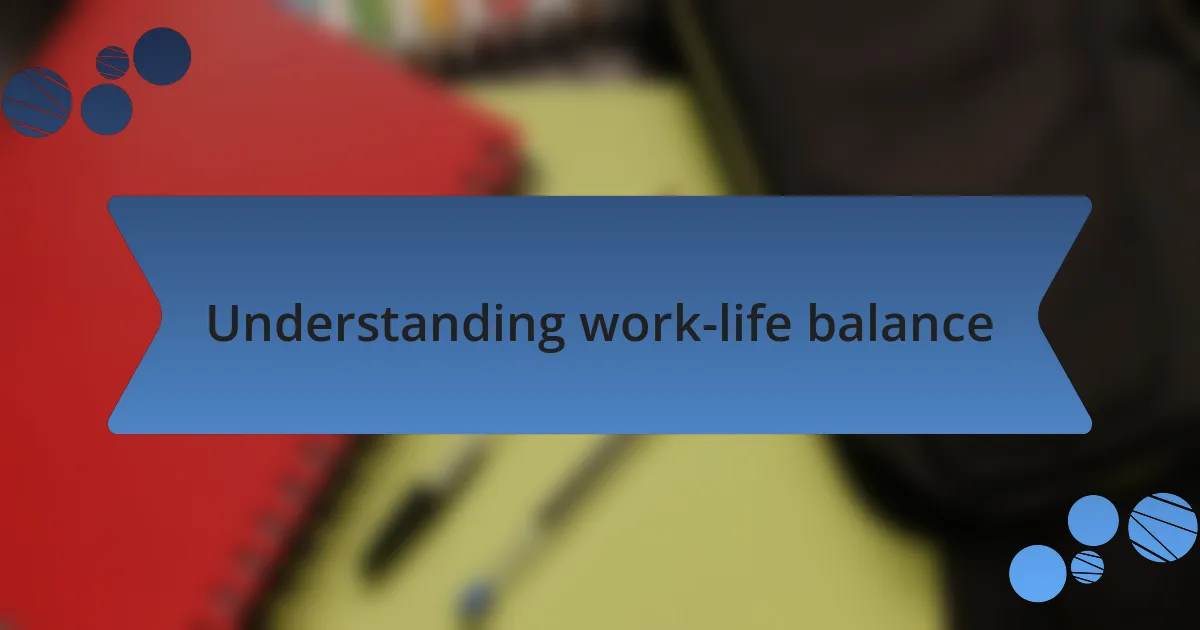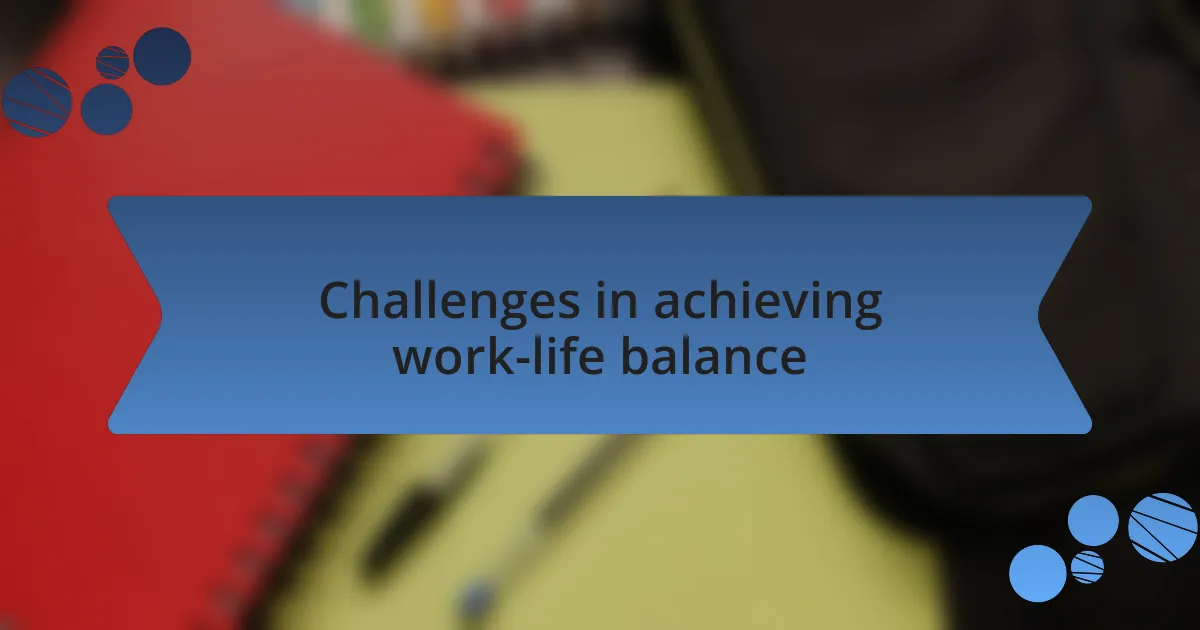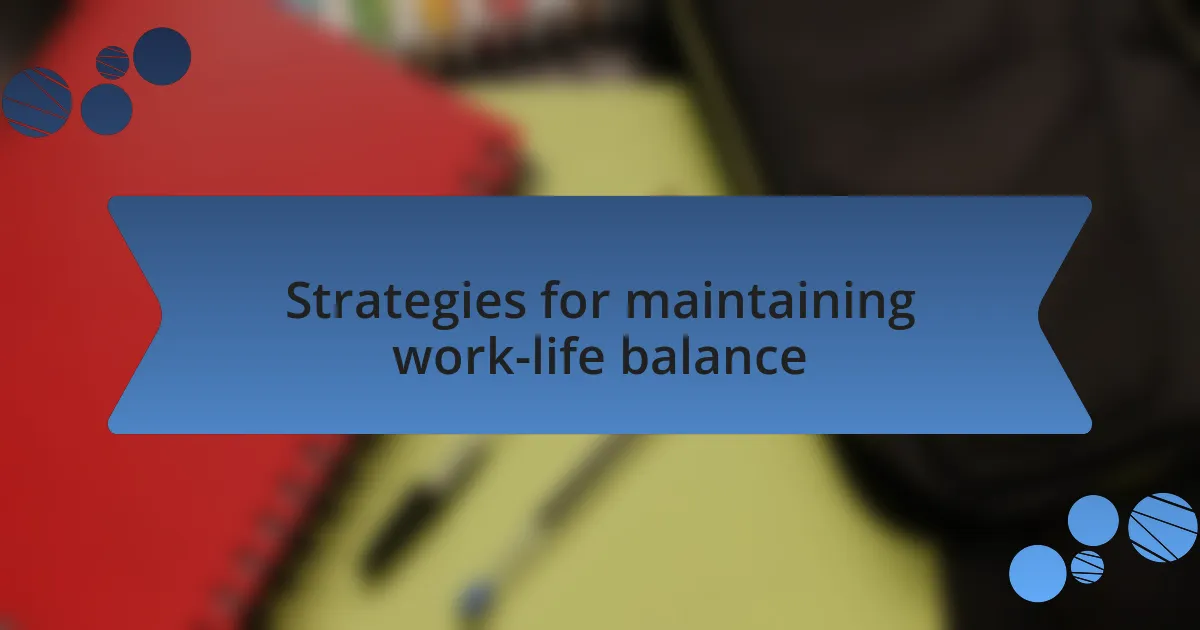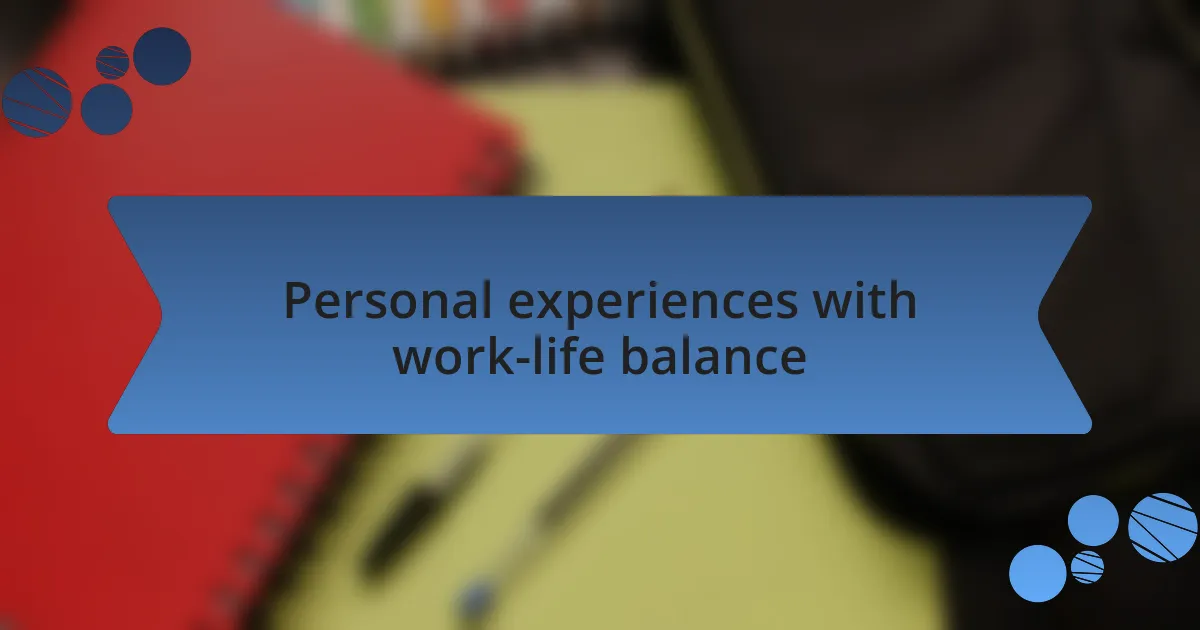Key takeaways:
- Achieving work-life balance involves quality time outside work, resulting in increased productivity and overall well-being.
- STEM fields often glorify long hours, creating challenges in setting boundaries and managing personal time.
- Effective strategies for balance include establishing work boundaries, prioritizing self-care, and embracing flexibility in schedules.
- Personal experiences highlight the importance of valuing relationships and self-care over work obligations for maintaining passion and mental health.

Understanding work-life balance
Work-life balance is often misunderstood, especially in demanding fields like STEM. I remember a time when I was buried under coursework and projects, convinced that more hours meant success. Yet, I quickly realized that burnout crept in when I ignored my personal time, leading me to question whether the endless grind was worth it.
Achieving a healthy work-life balance isn’t just about dividing hours between work and personal activities; it’s about quality and fulfillment. I often ask myself, “Am I truly enjoying my time outside of work?” When I prioritized hobbies and relaxation, I noticed a boost in my productivity. It’s almost as if stepping away for a bit allowed my mind to reset, making me more efficient when I returned to my tasks.
The emotional toll of neglecting self-care can be profound. One semester, I pushed aside social gatherings to focus completely on my studies. While it felt noble initially, I soon found myself feeling isolated and overwhelmed. This experience taught me that integration—blending work with personal joy—creates not just a balance but enhances overall well-being and satisfaction.

Challenges in achieving work-life balance
Finding that sweet spot between work and life can feel like an uphill battle, especially in STEM. I remember my first internship; I wanted to impress my supervisors so badly that I frequently stayed late, sacrificing my evenings. At the time, I thought my dedication would pay off, but looking back, I realize it resulted in stress that overshadowed what could have been a rewarding experience.
Another challenge is that STEM fields often cultivate a culture where long hours are glorified. I once attended a tech conference where the conversation consistently revolved around who worked the hardest and sacrificed the most. It left me wondering: at what cost does this level of commitment come? The pressure to conform can blur the lines between ambition and personal happiness, making it difficult to set boundaries.
Moreover, juggling multiple responsibilities can be overwhelming. During finals week, I found myself torn between studying for exams and completing a group project, not to mention keeping up with my job. Each commitment felt urgent, and I couldn’t shake the anxiety of falling short in any area. This experience drove home the point that without effective time management and prioritization, achieving a balance becomes nearly impossible.

Strategies for maintaining work-life balance
One effective strategy for maintaining work-life balance is setting clear boundaries between work and personal time. I vividly remember a period in my life when I would respond to work emails late into the night. It felt productive at first, but soon I realized it encroached on my time with friends and family. Now, I designate specific hours for work and strictly adhere to them, allowing myself to fully engage in personal activities without distractions.
Another approach I’ve found helpful is prioritizing self-care and downtime. I used to think that squeezing every minute out of my day was the path to success, but I soon learned that burnout makes productivity unsustainable. Incorporating regular breaks and leisure activities—whether that’s enjoying a walk, reading, or diving into a hobby—has revitalized my focus and energy, making me more effective at work when I am there. How can we perform at our best if we’re running on empty?
Finally, embracing flexibility in my schedule was a game changer. There have been times when a project deadline loomed, and I felt compelled to put everything else on hold. Now, I understand the importance of adapting my plan to allow for unforeseen circumstances, whether it be in my academic or professional life. Sometimes, rearranging my tasks or asking for support can alleviate a lot of pressure, leading to a more manageable balance between work and life commitments.

Personal experiences with work-life balance
I vividly recall a semester in college when I took on more than I could handle, convinced that sacrificing personal time was a rite of passage in STEM fields. As the weeks dragged on, my enthusiasm dwindled, leaving me exhausted and disconnected from friends. I had to ask myself, was the academic pressure worth sacrificing my well-being? This experience taught me that work-life balance isn’t just a buzzword; it’s essential for maintaining not only my mental health but my passion for my field as well.
During my internship, the demands fluctuated wildly, and I often found myself working late into the evening to meet tight deadlines. There was a moment when I missed a friend’s wedding because I chose to finish a project. The regret was palpable, and it made me rethink my priorities. In hindsight, I realize that such moments are fleeting; I can always work on a project, but I cannot relive those important life events. This realization pushed me to set firmer boundaries and prioritize what truly matters.
On the flip side, I’ve discovered small joys in integrating leisure into my work routine. For instance, I started taking short, intentional breaks to step away from my desk, even if just for a few minutes. I found that simply getting outside for some fresh air or enjoying a quick chat with a friend reignited my creativity and energy. Isn’t it interesting how those brief moments of disconnect can lead to more productive and focused work? Balancing work and life is ongoing, but these small adjustments have made all the difference for me.